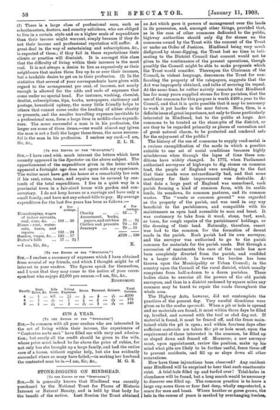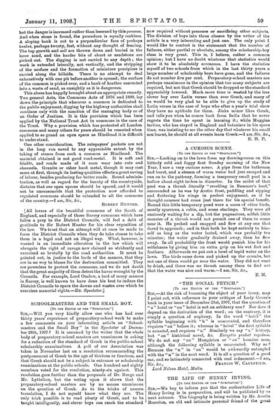STONE-DIGGING ON HINDHEAD.
[To THE EDITOIL OF THE "SPEOTATOIL."]
SIE,—It is generally known that Hindhead was recently purchased by the National Trust for Places of Historic Interest or Natural Beauty, and is held by that body for the benefit of the nation. Last Session the Trust obtained
an Act which gave it powers of management over the lands in its possession, and, amongst other things, provided that, as in the • case of other commons dedicated to the public. ' highway authorities should only dig for. 'stones on the commons owned by the Trust with the. consent of the Trust or under an Order of Justices. Hindhead being very much disfigured by stone-digging, the Trust -lost no time in -inti- mating to the District Council that consent would not be given to the continuance of the present operations, though possibly the Council might be able to make proposals which the Trust would consider. Thereupon the Chairman of the Council, in violent language, denounces the Trust for con- fiscating the property of the ratepayers, suggests that • the Act was improperly obtained, and talks of securing its repeal. At the same time, he rather neIvely remarks that Hindhead- has for many years supplied stones for four parishes, that the use of the common for this purpose is worth 2400 a year to the Council, and that it is quite possible that it may-be necessary to work it yet harder in the near future. Here, then, is a definite issue of great importance, not only to those particularly interested in Hindhead, but to the public at large. Are commons to be treated as the stone-pits of the district, or are they to be regarded primarily as places of recreation and. of great natural charm, to be protected and rendered safe for the enjoyment of the public P The history of the use of commons to supply road-metal is a curious exemplification of the mode in which a, practice suitable to one set of social conditions becomes highly mischievous when through the lapse of time these con- ditions have widely changed. In 1772, when Parliament authorised surveyors of highways to dig stones on common land, the people Of England were awaking to the fact that their roads were extraordinarily bad, and that some machinery for their improvement was desirable. Al that date a large part of England was unenclosed, each parish forming a kind of common farm, with its arable lands, its meadows, its common pastures, and its common wastes. The "waste or common ground" was regarded as the property of the parish, and was used in any way beneficial to the parishioners, and compatible with its maintenance as open land accessible to man and beast. It was customary to take from it wood, stone, turf, sand, or loam, for rough repairs of the parishioners' holdings, or the dressing of their land. Naturally, therefore, resort was had to the common for the formation of decent roads in the parish. Each parish had its own surveyor, and the surveyor was authorised to go to the parish 'common for materials for the parish roads. But through a succession of enactments the care of the roads has now been completely diverted from the parish, and confided to a larger district. In towns the burden has been thrown upon the Municipality or Urban Council ; in the country upon the Council of the rural -district, which usually comprises from half-a-dozen to a dozen parishes. These bodies claim to exercise all the powers of the old parish surveyors, and thus in a district reckoned by square miles any- common may be taxed • to repair the roads throughout the
whole area. •
The Highway Acts, however, did not contemplate the practices of the present day. Very careful directions were given as to the modus operandi. When a pit or hole is opened and no materials are found, it must within three days be filled up, levelled, and covered with the turf or clod dug out. If material is found, it must be fenced off, and the fence main- tained while the pit is open; and within fourteen days after sufficient materials are taken th3 pit or hole must, upon the requirement of those interested in the common, be filled up or sloped down and fenced off. Moreover, a new surveyor must, upon appointment, review the position, make- up his mind what pits are likely to be further useful, fence them off to prevent accidents, and fill up or slope down all other excavations.
How have these injunctions been observed? Any resident near Hindhead will be surprised to hear-that such enactments exist. A trial-hole filled up and turfed over ! Trial-holes in abundance-will be found, but a long search would be necessary. to discover one filled up. The common practice is to leave a large cup- some three or four feet •deep, wholly unprotected, a snare for man and beast. Where heather or gorse grows, the hole in the course of yearii is masked by overhanging 'buslxeep
but the danger is increased rather than lessened.by this process. And when stone is found, the procedure is equally reckless. A sloping bank is cut to a- perpendicular face of perhaps twelve, perhaps twenty, feet, without any thought of fencing. The top growth and soil are thrown down and buried in the loose sand, and the harder bits of °hurt or sandstone are picked out. The digging is not carried to any depth ; the work. is extended laterally, not vertically, and the stripping of. the' surface and the formation of miniature precipices is carried along the hillside. There is no attempt to deal exhaustively with one pit before another is opened; the surface of the common is picked over, and a bank of heather converted into a waste of sand, as unsightly as it is dangerous.
This abuse has happily brought about an.appropriate remedy. Two general Acts, the Commons Acts of 1876 and 1899, lay down the 'principle that wherever a common is dedicated to the public 'enjoyment, digging by the highway authorities shall continue only with the sanction of the managing body or of an Order of Justices. It is this provision which has been applied by the National Trust Act to commons in the care of the Trust. Why a provision which has protected all London commons and many others for years should be resented when applied to so grand an open space as Hindhead it is difficult' to understand.
One other consideration. The ratepayers' pockets are not ill. the long run saved to any appreciable extent by the taking of stones from such a common as Hindhead. The material obtained is not good road-metal. It is soft and friable, and roads made of it soon wear into ruts and channels. Granite ,or other hard metal, though it 'may cost more at first, through its lasting qualities effects a great saving of labour, besides producing far better roads. Sound. ad minis- tration, as well as regard for the beauty of the countryside, dictates that our open spaces should be spared, and it would not be unreasonable that the protection now afforded to regulated commons should be extended to all the commons of the country.—I am, Sir, &c.,
ROBERT HUNTER.
[All lovers of the beautiful commons of the South of England, and especially of those Surrey commons which have fallen a prey to the District Councils, will feel a debt of gratitude to Sir Robert Hunter for his clear expesition of the law. We trust that an attempt will at once be made to force the District Councils when they do take stones to take them in a legal and not an illegal way. What, however, is wanted is an immediate alteration in the law which will abrogate the right of ravage now claimed so stridently and exercised so brutally by the road authorities. It must be pointed out, in justice to the lords of the manors, that they are in no way to blame for the destruction committed. They are powerless to protect the commons, and we do not doubt that the great majority of them detest the havoc wrought by the Councils. For example, Lord Onslow, a lord of many manors in Surrey, is well known to have done his beat to induce the District Councils to spare the downs and wastes over which he exercises manorial rights.—En. Spectator.]











































 Previous page
Previous page